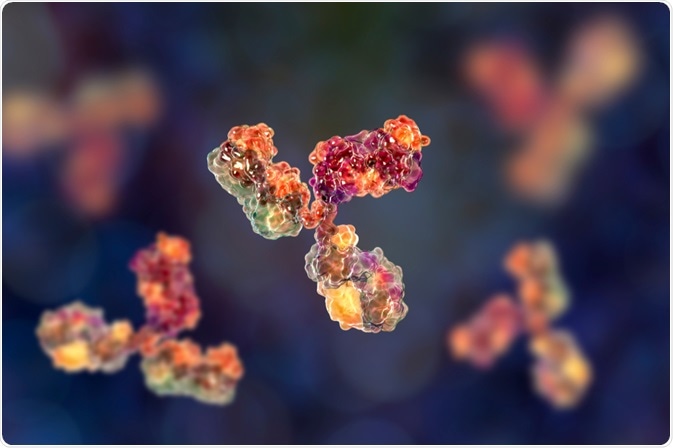The immune system helps individuals protect themselves from a wide range of pathogens. Antibodies are used to identify antigens (e.g., pathogens such as bacteria, viruses) and neutralize them inside the body. These Y-shaped proteins are also known as immunoglobulins and are developed by B cells' response to antigens.

Antibodies. Image Credit: Kateryna Kon/Shutterstock.com
Owing to their high selectivity and specificity, they are extensively used in biomedical research, mainly, in therapeutics, diagnostics, and many other areas. This article discusses the different types of antibodies used in research and their applications.
Scientists have broadly classified antibodies into two groups, namely, monoclonal and polyclonal antibodies. The two most important characteristic features of antibodies required for clinical studies are the specificity of binding and homogeneity, especially, in the case of monoclonal antibodies. Another important factor is the production of high-quality and unlimited quantities of antibodies. The two major classes of antibodies used in research are discussed below:
Monoclonal Antibodies (MAbs)
Monoclonal antibodies are a mixture of homogenous antibody molecules that show affinity towards a specific antigen. These are produced using hybridoma (immortal) by fusing B-cells with a single line of cells containing a specific antibody gene. Thereby, a population of identical cells is produced which produces the same type of antibody. Owing to their high specificity and high reproducibility, MAbs are used more in research when compared to polyclonal antibodies PAbs.
In 1975, Köhler and Milstein produced monoclonal antibodies, whereby, the true potential of antibody research came to light. MAbs are extensively used in research, especially, in pharmacy, therapeutics, and diagnostics. They are used as clinical therapeutic tools in immunological disorders and cancers. Thereby, there is a great demand for monoclonal antibodies in research laboratories across the world.
Another type of antibody is known as a recombinant antibody. This is a type of monoclonal antibody whose sequence is first identified and, subsequently, produced synthetically. Examples of recombinant antibodies are Human Embryonic Kidney (HEK) or Chinese Hamster Ovary (CHO) cells.
Owing to their high specificity, MAbs have proved to be invaluable for basic immunological and molecular research. As mentioned above, MAbs have wide-ranging applications. They are used in research concerning the structure of cell membranes, purification of complex mixtures, human therapy, hormone tests, preparation of vaccines, cancer therapy, commercial protein purification, suppressing immune responses, diagnosis of diseases, diagnosis of allergy, increasing the effectiveness of medical substances, and identification of specialized cells.
Polyclonal Antibodies (PAbs)
This group of antibodies represents a heterogeneous mixture of antibodies that is directed against various epitopes on the same antigen. It is a heterogeneous combination of IgGs pitted against the entire antigen. These antibodies are produced by different B-cell clones of animals and owing to this mechanism, polyclonal antibodies are immunochemically dissimilar, with different specificities and affinities.
The advantages of using these antibodies in research are that they are inexpensive, and are produced within a short time. They are less sensitive to minor changes in the antigen. Further, these antibodies can be produced in different animals and purification methods are relatively simple, i.e., by using high-affinity chromatography methods.
However, there are a few disadvantages that are associated with the use of polyclonal antibodies in research. For instance, the chance for cross-reaction is high. A second limitation is that the antibody response depends on the host animal whose life span is limited.
Application of Antibodies in Various Research Techniques
Antibodies can bind with an unlimited number of target proteins with high specificity. In 1900, Paul Ehrlich referred to antibodies as “magic bullets”. Antibodies are used in various studies owing to their unique specificity.
For example, they are used to identify unknown molecules and understand various biochemical pathways. Widely used laboratory techniques such as enzyme-linked immunosorbent assay (ELISA), radioimmune assay (RIA), confocal microscopy, electron microscopy, western blot, immunohistochemistry (IHC), flow cytometry, etc., are based on antibodies. MAbs are used for the delivery of a radioisotope, toxin, cytokine, and other active conjugates.
MAbs are used to identify various cell types that are associated with immune responses and to understand the mechanism behind such responses. Further, MAbs are also used to study the changes in T and B-cells during their development. Owing to their specific binding property, antibodies are used in various diagnostic assays, for example, detection of infections, identification of allergies, and the measurement of hormones in the blood sample. They are also used as biological markers in the blood.
Primary antibodies (monoclonal or polyclonal) are required in various cancer-related research. For instance, they help in the understanding of inflammation, metastasis, proliferative signaling, apoptosis, autophagy, metabolism, tumor suppressors, etc. These are also required to study stem cells such as endothelial stem cell markers (e.g., CD14, CD31, CD33). Epigenetic studies are carried out using specific recombinant epigenetic antibodies. Primary antibodies are also used in the study of protein trafficking, neurogenesis, axon guidance, dendrite development, neuromuscular junction, neurotrophins, and other neurological studies.
Researchers face many challenges in research that involve antibodies, particularly owing to the issues with the quality of antibodies supplied by the manufacturer. Another problem is the lack of basic information about the methods used to produce antibodies. For example, in the case of protein antibodies, information such as if the antibody was developed against a native, denatured, or fragmented antigen is often not provided. These pieces of information are essential for research.
Further, the most prominent characteristic of an antibody is its ability to form antibody-antigen complexes. However, very few manufacturers calculate affinity constants for antibodies and their respective antigens while selling the antibodies.
Further Reading
Last Updated: May 17, 2021